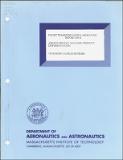| dc.contributor.author | Botimer, Theodore Charles | en_US |
| dc.contributor.other | Massachusetts Institute of Technology. Flight Transportation Laboratory | en_US |
| dc.date.accessioned | 2012-01-06T22:26:41Z | |
| dc.date.available | 2012-01-06T22:26:41Z | |
| dc.date.issued | 1993 | en_US |
| dc.identifier | 37690894 | en_US |
| dc.identifier.uri | http://hdl.handle.net/1721.1/68119 | |
| dc.description | October 20 1993"--P. 2 | en_US |
| dc.description | Cover title | en_US |
| dc.description | Also issued as an Ph.D. thesis, MIT, Dept. of Civil and Environmental Engineering, 1994 | en_US |
| dc.description | Includes bibliographical references (p. 282-286) | en_US |
| dc.description.abstract | Airlines offer combinations of price level and purchase restrictions, or fare products, designed to best maximize revenues on their flights. This dissertation provides the first comprehensive examination of the differentiated fare product structure on the market today in terms of passenger demand, airline revenue, and societal welfare. The role of pricing in the airline revenue management function is established first. The types of price discrimination currently practiced by airlines, as defined in the economics literature, are then identified. Although the terms airline product differentiation and price discrimination have previously been used interchangeably, the two practices are shown to differ and exist simultaneously in the current industry environment. Next, airline revenue management techniques and, in particular, fare product differentiation are examined from the standpoint of economic efficiency. This dissertation concludes that both efficiency in exchange and Pareto optimality are unattainable under the current structure of airline fare product differentiation as a result of the costs incurred by passengers due to applied purchase restrictions. It is found, however, that a differentiated fare product structure with a wide range of price levels coupled with effective revenue management techniques can provide airline seats to those consumers who value them most when demand exceeds supply. Efficiency in allocation can thus be achieved in the current industry environment. Virtually every existing yield management seat allocation model assumes that consumers view differentiated airline fare products as separate products with | en_US |
| dc.description.abstract | (cont.) uncorrelated demands that compete for space on a fixed capacity aircraft. Such formulations ignore the dependence of the demand for a given fare product on the price levels and characteristics of the other available (competing) fare products. In this dissertation, a model of product differentiation that considers the interrelationships of the available airline fare products as well as the cost incurred by consumers of accepting more restricted (and less flexible) products is presented. This generalized cost model of airline fare product differentiation explicitly incorporates the techniques of fare product differentiation and price discrimination currently used by airlines. The generalized cost model is extended to incorporate the "buy down" or diversion of passengers to lower-priced fare products as a result of their ability to meet the additional purchase restrictions imposed by airlines. Moreover, diverting passengers may be induced to "sell up" to higher-priced fare products when booking limits are applied to the lower-priced products. The generalized cost model contributes the first behavioral motivation of both passenger diversion and sell up. The dissertation demonstrates the use of booking limits as devices to control and limit the revenue dilution effects of passenger diversion. The effects of pricing and other fare product design decisions are quantified for any set of OD market conditions using the generalized cost model. The model provides insight into the underlying effects of the tradeoffs made by airlines when making pricing and marketing planning decisions. In summary, this research provides the first cohesive look at the relationships between price level, purchase restrictions, demand, and revenue in the context of airline product differentiation and yield management. | en_US |
| dc.format.extent | 286 p | en_US |
| dc.publisher | Cambridge, MA : Massachusetts Institute of Technology, Flight Transportation Laboratory, [1993] | en_US |
| dc.relation.ispartofseries | FTL report (Massachusetts Institute of Technology. Flight Transportation Laboratory) ; R93-4 | en_US |
| dc.subject | Airlines | en_US |
| dc.subject | Rates | en_US |
| dc.title | Airline pricing and fare product differentiation | en_US |
| dc.type | Technical Report | en_US |
